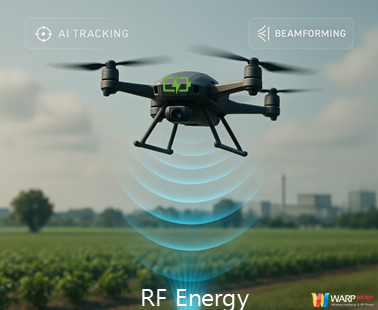RF Wireless Charging for Drones: Enabling Continuous Flight
Author
Admin
Date
2025-05-09 13:00
Views
93
Drones are redefining industries — from logistics and agriculture to security and infrastructure inspection. But one issue continues to limit their full potential: short battery life. Frequent landings for recharging not only waste time but also disrupt mission-critical operations that require continuity and autonomy. Wireless charging is emerging as a solution to overcome this limitation. At the forefront of this innovation is WARP Solution, which is currently developing advanced RF wireless charging technology designed to support uninterrupted drone operations across a wide range of industrial scenarios.

The Challenge of Battery Constraints in Drones
Despite ongoing improvements in battery efficiency, most commercial drones still operate within a 20- to 40-minute flight window. This short operational time poses a serious challenge for use cases such as real-time surveillance, crop monitoring, infrastructure inspection, and disaster response. Today, most operators rely on manual charging or battery replacement, both of which require labor, infrastructure, and often bring operations to a halt.
Wireless power transfer presents a new approach. WARP Solution is actively exploring how drones could recharge autonomously—either through landing at designated charging stations or eventually receiving energy mid-air via wireless transmission. These advancements aim to reduce downtime, increase mission duration, and move drone operations toward full autonomy.
The Potential of RF Wireless Charging
Among wireless power technologies, Radio Frequency (RF) charging stands out due to its ability to deliver power over distance, without physical contact or precise alignment. Unlike inductive charging pads, RF systems are being designed to transmit energy through the air, offering greater flexibility in dynamic environments. WARP Solution is currently developing an AI-powered RF charging platform that combines real-time object tracking with intelligent beamforming. This system is intended to detect drone positions and optimize the energy transmission path accordingly, even as they move. While this capability is still under refinement, the goal is to enable drones to stay charged seamlessly—on the ground or potentially while airborne—without disrupting their tasks.
Emerging Applications and Real-World Potential
The potential applications of RF wireless charging for drones are wide-ranging. In logistics, mid-route charging could support long-distance deliveries. In agriculture, drones might perform continuous crop analysis or spraying without returning to base. In public safety, autonomous drones could patrol and monitor environments for extended periods without human intervention.
WARP Solution is currently testing early-stage use cases in collaboration with industrial partners. These initial pilots focus on fixed-point autonomous charging in controlled environments, such as smart farming zones or logistics facilities. These efforts are laying the foundation for broader, long-term deployments in outdoor, multi-device, and mobile scenarios.
Looking Ahead: From Pilot Projects to Scalable Infrastructure
WARP Solution’s long-term vision is to establish a scalable RF charging network for drone fleets—enabling drones to receive power dynamically while on mission. Realizing this vision will require regulatory approvals, including certifications like FCC (U.S.), CE (Europe), and MIC (Japan), as well as collaborative efforts with drone manufacturers to ensure system compatibility and safety. Although the technology is still in development, WARP Solution is advancing rapidly through research, testing, and certification preparation. The company’s RF system is being engineered not only for technical performance but also for compliance, security, and efficiency—ensuring that the transition from lab to field is smooth and impactful.
Conclusion
The idea of continuous drone flight is becoming more realistic, not through battery breakthroughs, but through smarter ways to deliver power. WARP Solution is helping lead that transformation by developing RF wireless charging systems that are designed to keep drones powered without cables, cradles, or interruptions. While the technology is still in progress, its future applications hold immense promise.
As the world moves toward autonomous, always-on drone systems, wireless energy will become a key enabler—and WARP Solution is working today to make that future possible.

